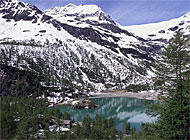Water resources in the Alps need protecting

Scientists around the world have identified water shortage as one of the greatest problems of our time. Even in Switzerland, a hydrological paradise, experts are warning that the precious commodity should not be taken for granted.
“Around the world, the provision of clean drinking water is more problematic than the supply of food,” said Dr Kurt Hanselmann of Zurich University’s plant and microbiology institute.
“In the Alps, which are often considered the water tower of Europe, the situation is different. It’s rare that we lack water or that quality is an issue and, for that reason, the public hasn’t really developed an awareness.
“It’s hard to imagine a situation where Swiss rivers and lakes are anything other than pure. We’re blessed with superb conditions, which we take for granted and we forget just how we should be protecting our water resources.”
At a meeting in Lucerne organised by the commission for Swiss Alpine studies, experts discussed topics ranging from the quality of drinking water, the provision of supplies, the privatisation of water services and the degradation of aquatic ecosystems.
Conflicts of use
About 70 per cent of fresh water resources are used for agriculture and the demands of industry and energy are growing rapidly. The conference discussed potential conflicts of use in the coming years.
Alpine ecosystems are susceptible to all sorts of environmental changes which are likely to have an impact on water resources, said Claudia Pahl-Wostl of the federal institute for environmental science and technology.
“Climate change and the increasing probability of extreme weather has important consequences for Alpine regions where water is not only the cause of natural catastrophes but also an energy source,” she said.
On a world scale, the supply of fresh water is running out. The amount available for human use is less than 0.08 per cent of all the water on the planet, yet over the next two decades our use is estimated to increase by about 40 per cent. Already one person in five has no access to safe drinking water.
The World Commission on Water for the 21st century estimates that by 2020, 17 per cent more water than is available will be needed to grow the world’s food. Some experts have predicted that it will be water, not oil or land, which triggers the next Middle East war.
by Vincent Landon

In compliance with the JTI standards
More: SWI swissinfo.ch certified by the Journalism Trust Initiative
You can find an overview of ongoing debates with our journalists here. Please join us!
If you want to start a conversation about a topic raised in this article or want to report factual errors, email us at english@swissinfo.ch.